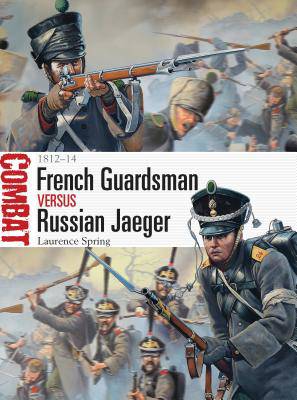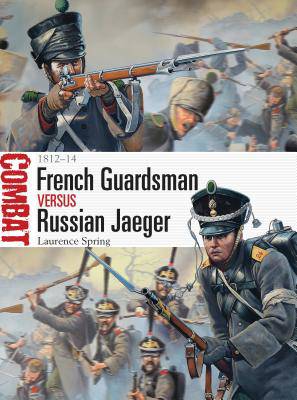
- Retrait gratuit dans votre magasin Club
- 7.000.000 titres dans notre catalogue
- Payer en toute sécurité
- Toujours un magasin près de chez vous
- Retrait gratuit dans votre magasin Club
- 7.000.0000 titres dans notre catalogue
- Payer en toute sécurité
- Toujours un magasin près de chez vous
Description
After Napoleon's abandonment of Moscow on 18 October 1812, throughout the subsequent Wars of Liberation that saw most of Europe turn against the French and right up to the capitulation of Paris on 31 March 1814, it was the vast armies of Imperial Russia that bore the brunt of the fighting against forces of France and her dwindling list of allies. The Russian Jaegers - nominally skirmishers, but in reality spearhead troops tasked with a host of different and demanding battlefield roles, from storming villages to defending strongpoints - were a relatively new arm of service that gained enormously in combat experience and prestige in the bitter struggle to rid Europe of Napoleon's armies. The French Emperor's Young Guard - elite assault troops hand-picked from the best conscripts available - expanded hugely in the first months of 1813, eventually forming four divisions, and became the main strike force of the French field armies in the battles for Germany and France in 1813-14.
These two forces clashed repeatedly during the period. At Krasnoe, southwest of Smolensk, the Russian forces overtook the retreating French army and threatened the invaders' road home, and so on 17 November 1812 the 1er Tirailleurs and 1er Voltigeurs of Roguet's 2nd Guard Infantry Division were ordered to take and hold the town of Uvarovo to cover the retreat of other French troops, clashing with the Tsar's Lifeguard Jaegers among others; although they held off the Russians and allowed Napoleon's decimated forces to evade capture, the two senior Young Guard regiments suffered appalling casualties. At the climactic battle of Leipzig nearly a year later the Finland Lifeguard Regiment, equipped and trained as Jaegers, took part in the Russian 2nd Lifeguard Infantry Division's successful counter-attack on the hotly contested Saxon village of Gossa on 16 October 1813, ejecting the French garrison, which included several Voltigeur regiments of Oudinot's I Infantry Corps of the Young Guard. At Craonne, near Reims, the veteran 14th Jaegers played a key role in frustrating Napoleon's plans to advance on Laon; these crack troops defended their well-sited emplacements for several hours, throwing back the Tirailleurs and Voltigeurs of Meunier and Curial's Young Guard divisions, which had attacked prematurely over difficult ground under heavy artillery fire. Featuring specially commissioned artwork, expert analysis and carefully chosen first-hand accounts, this absorbing study traces the evolving trial of strength between Russia's Jaegers and France's Young Guardsmen by examining three key clashes at unit level.Spécifications
Parties prenantes
- Auteur(s) :
- Editeur:
Contenu
- Nombre de pages :
- 80
- Langue:
- Anglais
- Collection :
- Tome:
- n° 4
Caractéristiques
- EAN:
- 9781782003625
- Date de parution :
- 19-11-13
- Format:
- Livre broché
- Format numérique:
- Trade paperback (VS)
- Dimensions :
- 178 mm x 244 mm
- Poids :
- 249 g

Les avis
Nous publions uniquement les avis qui respectent les conditions requises. Consultez nos conditions pour les avis.






